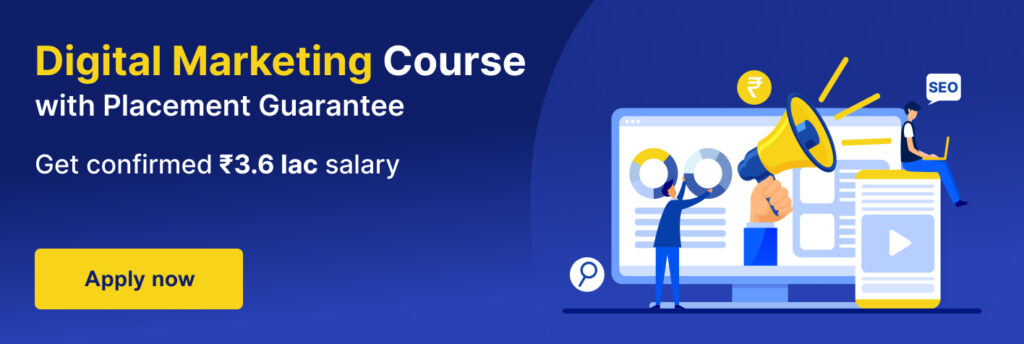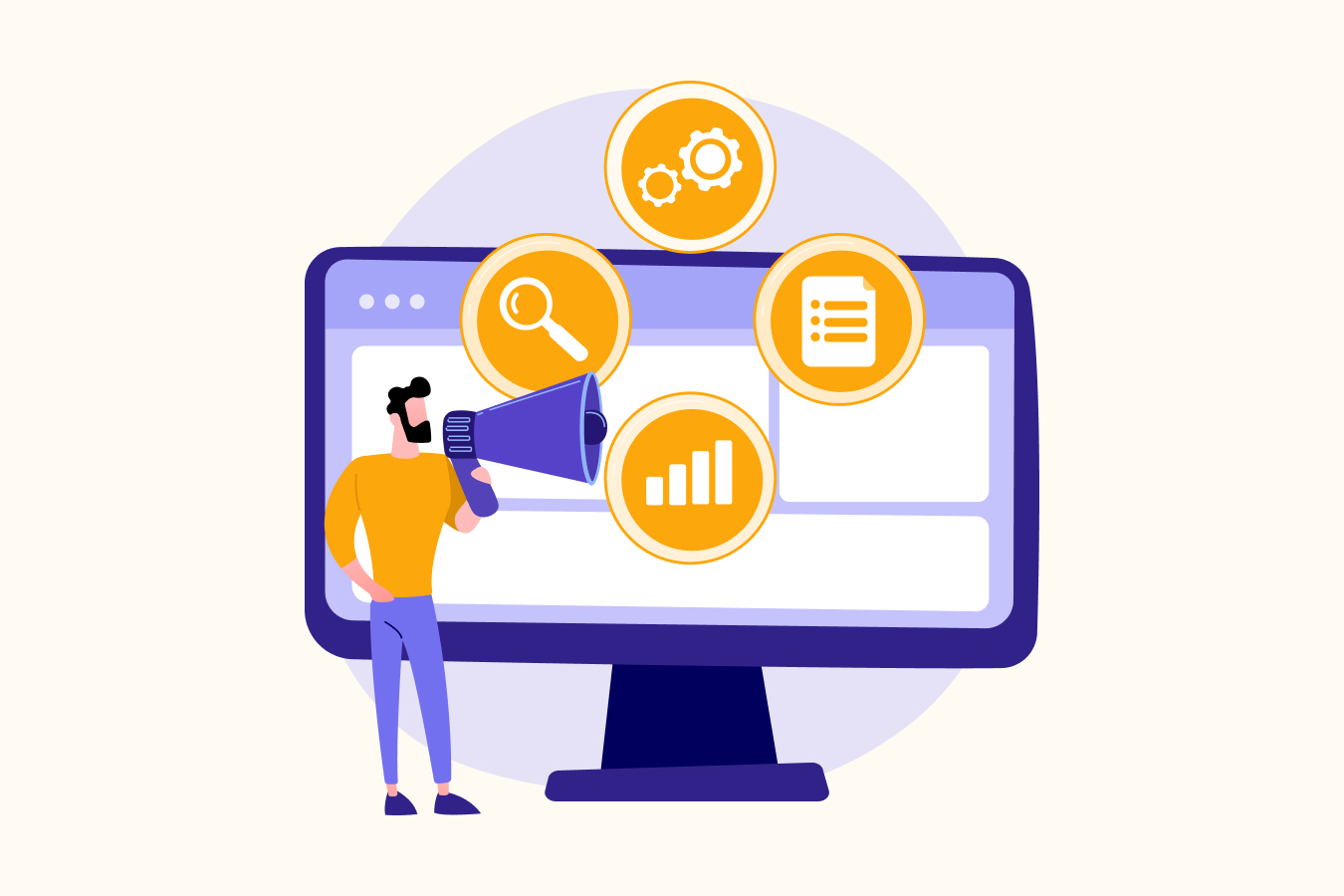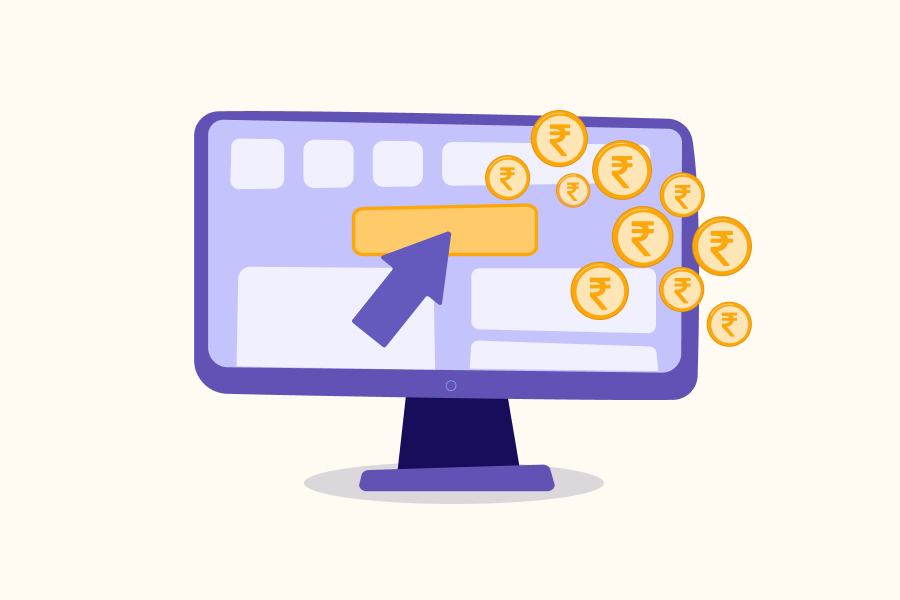Digital Marketing Roadmap to Follow in 2024
Digital marketing is the promotion of brands using digital channels, such as email and social media. The scope of digital marketing in India is immense with an increasing use of digital channels, the proliferation of start-ups and small/medium enterprises, and the need for businesses to leverage digital marketing for growth. This blog covers a comprehensive digital marketing roadmap that will assist you in building a promising career in digital marketing.
Digital Marketing Roadmap Become an Expert
The digital marketing journey offers a huge scope for career advancement due to increased dependency on the Internet. To excel in this field, you require digital marketing skills, including search engine optimization and social media marketing. Moreover, as a digital marketer, it is essential to possess soft skills, such as strong problem-solving skills, communication skills, and creative thinking abilities. Consider this digital marketing roadmap to acquire a comprehensive understanding of digital marketing.
Step 1: Understand the Fundamentals of Digital Marketing
The first step of the digital marketing roadmap is to gain a strong understanding of the key fundamentals and elements of digital marketing. A comprehensive understanding of the concepts enables you to make better strategies and decisions. You can also explore some popular courses such as Internshala’s digital marketing placement guarantee course, which assists you with practical learning from industry experts and comes with a guaranteed placement.
When learning digital marketing fundamentals, ensure to study these concepts:
a) The Purpose of Digital Marketing
The purpose of digital marketing is to achieve business goals through the use of digital platforms. It involves various strategies, such as search engine optimization (SEO), pay-per-click advertising (PPC), website marketing, content marketing, social media marketing (SMM), email marketing, and affiliate marketing. These strategies aim to generate traffic, create awareness, and convert leads into loyal customers.
The importance of digital marketing is immense for businesses as it allows them to reach their target audience more effectively, engage with them, and build relationships, leading to increased sales and revenue. It also provides measurable analytics, enabling businesses to track their campaign performance and make data-driven decisions. Overall, digital marketing is a cost-effective and efficient way for businesses to reach their target audience and achieve their marketing goals.
b) Essential Terms in Digital Marketing
Ensure to gain a good understanding of the following digital marketing terms:
- Goals and Objectives: These refer to what you want to achieve, such as increasing brand awareness, generating leads, or boosting sales.
- Key Performance Indicators (KPIs): These are metrics like website traffic, conversion rates, social media engagement, and email open rates used to measure digital marketing success and guide decision-making.
- Target Audience: The target audience is a segment that resonates with your product or brand. You can identify them by defining your buyer personas, including demographics, interests, and pain points.
- Digital Marketing Channels: They refer to channels utilized to communicate messages to your target audience digitally, for instance, social media or email.
- Digital Marketing Strategy: This involves creating a strategy where you have to work on the content that will be delivered, the channels to be utilized, goals that need to be achieved, and how to measure the effectiveness of the strategy.
- Performance Analysis: This refers to tracking your metrics, analyzing your results, and adjusting your strategy as needed to optimize your ROI.
Step 2: Know the Types of Digital Marketing Strategies
- Website Marketing: It is the process of developing and optimizing a website to attract and engage visitors, helping you drive conversions and revenue.
- Search Engine Optimization (SEO): SEO involves improving website visibility in search engine results through keyword optimization and link building.
- Content Marketing: Content marketing includes creating and sharing valuable, relevant, and consistent content, to attract and retain the target audience.
- Pay-per-click (PPC) Marketing: PPC marketing, a method where businesses financially support each click on their advertisement, plays a crucial role in driving targeted traffic to their website.
- Social Media Marketing: Social media marketing refers to leveraging social media platforms to build brand awareness, engage with customers, and drive website traffic.
- Influencer Marketing: Influencer marketing involves partnering with influencers to promote products or services to their followers, increasing brand visibility and credibility.
- Affiliate Marketing: Affiliate marketing refers to collaborating with affiliates to promote products or services, earning commissions for each sale or conversion.
- Email Marketing: Email marketing includes sending targeted, personalized emails to subscribers to build relationships, promote products or services, and drive sales.
Step 3: Gain Proficiency in Digital Marketing Tools
This step in the roadmap for digital marketing is crucial for various reasons. Digital marketing tools allow you to carry out digital marketing functions effectively by assisting in analysis, monitoring, scheduling, and mapping your marketing plan. Proficiency in these tools also opens doors to lucrative employment opportunities as companies seek these technical skills in their candidates. As such, here are the top four digital marketing tools you should be familiar with.
- HubSpot: A marketing, sales, and service platform that offers a suite of tools for inbound marketing, including email marketing, social media management, and lead generation.
- Google Ads/Facebook Ads: Paid advertising platforms target specific audiences using demographics, interests, and behaviors. They charge for each click or impression, giving businesses precise control over ad expenditures and audience reach.
- Hootsuite: This social media management platform enables businesses to schedule and publish content, track social media interactions, and evaluate performance across various social media channels.
- Ahrefs: A toolset for backlinks and SEO analysis that helps businesses improve their search engine rankings, conduct keyword research, and monitor their competitors’ online presence.


Step 4: Scrutinize Popular Case Studies
Case studies allow you to understand the digital marketing strategies of popular brands or brands that have a robust digital presence. Studying these brands and analyzing their journey provides you with insights into what works and what does not. This experimental learning enables you to make better decisions and learn from the mistakes made by other brands.
You can explore brands with popular online presence, such as BoAt, Zomato, and Nike. Moreover, you can analyze popular digital marketing campaigns, such as #Choosebeautiful by Dove, #DilHaiHindustani by MakeMyTrip, Mom’s Touch by Nivea, and FloatABoat by Paper Boat.
Step 5: Work on Digital Marketing Projects
This is the final step of the digital marketing roadmap. It’s time to apply your skills and knowledge to real-world projects. Engaging in digital marketing projects will solidify your understanding, reveal areas for improvement, and allow you to address them.
You can also consider building your website and crafting SEO-optimized blog posts to showcase your expertise. Additionally, you can establish a presence on Instagram by sharing content that reflects your interests. These endeavors will not only bolster your portfolio but also enhance your employability in the digital marketing industry.
Conclusion
With the uprising of the internet and social media platforms, digital marketing is the need of the hour. Become a part of this booming industry by following this digital marketing roadmap and mastering the art of creating successful digital marketing strategies. In addition to the above-mentioned steps, you can attend webinars, take digital marketing courses, or leverage the internet to keep on top of the industry trends. These strategies will further assist you in developing a deeper understanding of digital marketing.
FAQs
The digital marketing sector in India is experiencing rapid growth, with a significant portion of transactions conducted through online channels. It offers businesses immense profits from online leads and helps them reach marketing limitations. The most well-known strategies include SEO, PPC, website marketing, content marketing, SMM, email marketing, and affiliate marketing.
To become a digital marketer, you need to be a marketing savvy and possess data handling skills. Key disciplines include SEO, PPC, SMM, Content Marketing, Email Marketing, and Affiliate Marketing. Employers also look for candidates proficient in Google Analytics, Google and Facebook Ads, HubSpot, Hootsuite, Adobe Creative Suites, and SEO.
Digital marketing offers various career opportunities, including Digital Marketing Manager, Content Marketing Specialist, SEO Specialist, PPC Specialist, SMM Specialist, Email Marketing Specialist, and Affiliate Marketing Manager. These roles involve creating and implementing digital marketing strategies, managing digital marketing campaigns, and analyzing their performance to optimize results.






